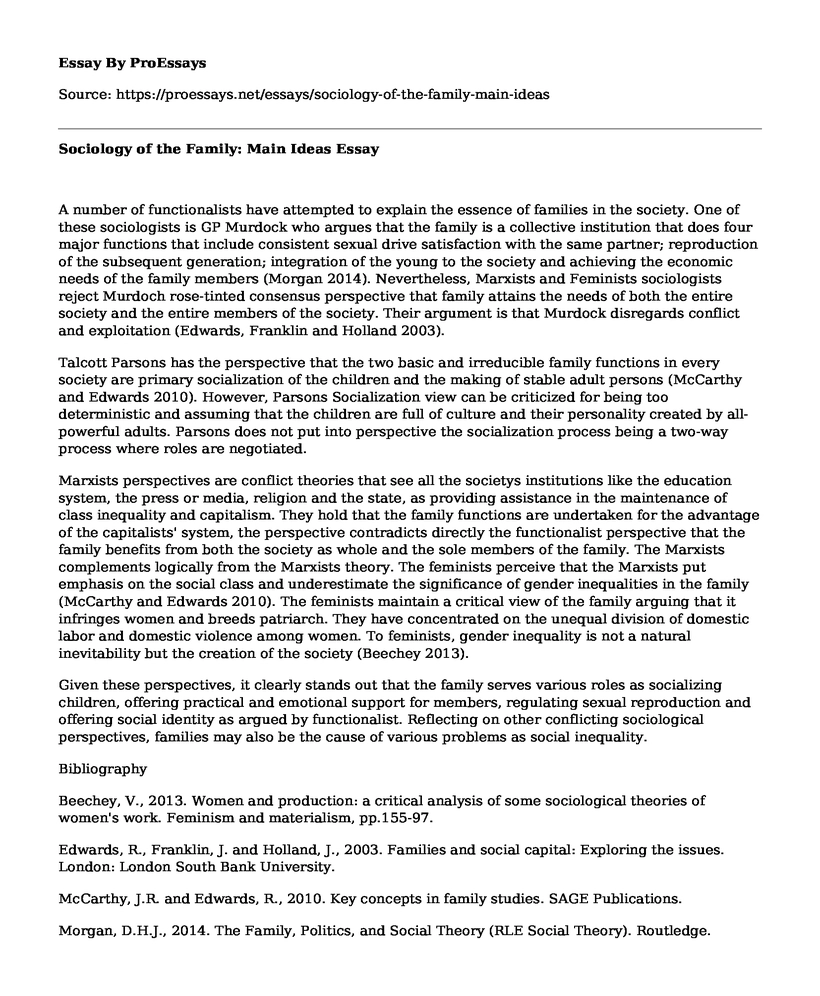A number of functionalists have attempted to explain the essence of families in the society. One of these sociologists is GP Murdock who argues that the family is a collective institution that does four major functions that include consistent sexual drive satisfaction with the same partner; reproduction of the subsequent generation; integration of the young to the society and achieving the economic needs of the family members (Morgan 2014). Nevertheless, Marxists and Feminists sociologists reject Murdoch rose-tinted consensus perspective that family attains the needs of both the entire society and the entire members of the society. Their argument is that Murdock disregards conflict and exploitation (Edwards, Franklin and Holland 2003).
Talcott Parsons has the perspective that the two basic and irreducible family functions in every society are primary socialization of the children and the making of stable adult persons (McCarthy and Edwards 2010). However, Parsons Socialization view can be criticized for being too deterministic and assuming that the children are full of culture and their personality created by all-powerful adults. Parsons does not put into perspective the socialization process being a two-way process where roles are negotiated.
Marxists perspectives are conflict theories that see all the societys institutions like the education system, the press or media, religion and the state, as providing assistance in the maintenance of class inequality and capitalism. They hold that the family functions are undertaken for the advantage of the capitalists' system, the perspective contradicts directly the functionalist perspective that the family benefits from both the society as whole and the sole members of the family. The Marxists complements logically from the Marxists theory. The feminists perceive that the Marxists put emphasis on the social class and underestimate the significance of gender inequalities in the family (McCarthy and Edwards 2010). The feminists maintain a critical view of the family arguing that it infringes women and breeds patriarch. They have concentrated on the unequal division of domestic labor and domestic violence among women. To feminists, gender inequality is not a natural inevitability but the creation of the society (Beechey 2013).
Given these perspectives, it clearly stands out that the family serves various roles as socializing children, offering practical and emotional support for members, regulating sexual reproduction and offering social identity as argued by functionalist. Reflecting on other conflicting sociological perspectives, families may also be the cause of various problems as social inequality.
Bibliography
Beechey, V., 2013. Women and production: a critical analysis of some sociological theories of women's work. Feminism and materialism, pp.155-97.
Edwards, R., Franklin, J. and Holland, J., 2003. Families and social capital: Exploring the issues. London: London South Bank University.
McCarthy, J.R. and Edwards, R., 2010. Key concepts in family studies. SAGE Publications.
Morgan, D.H.J., 2014. The Family, Politics, and Social Theory (RLE Social Theory). Routledge.
Cite this page
Sociology of the Family: Main Ideas. (2021, Mar 03). Retrieved from https://proessays.net/essays/sociology-of-the-family-main-ideas
If you are the original author of this essay and no longer wish to have it published on the ProEssays website, please click below to request its removal:
- How Does Childhood Attachment Style Affect The Ability To Build And Maintain Relationships In Adulthood?
- Report Example on The Social Life of Small Urban Spaces by William H. Whyte
- Essay Sample on Cultures: Different Forms of Communication Around the World
- Essay Sample on Museums: Preserving Our World's History & Culture
- Research Paper on Sexting: Exploring the Revolution of Digital Era Communication
- Essay Example on Alex & Shirley: A Tale of Family & Strength
- Cellular Technology: Revolutionizing Communication - Essay Sample







